Paramount leader
| Paramount leader | |||||||
| Simplified Chinese | 最高领导人 | ||||||
|---|---|---|---|---|---|---|---|
| Traditional Chinese | 最高領導人 | ||||||
| |||||||
In modern Chinese politics, the paramount leader (simplified Chinese: 最高领导人; traditional Chinese: 最高領導人; pinyin: zuìgāo lǐngdǎorén) of the Communist Party of China and the government of China is an informal term that refers to the most prominent political leader in the People's Republic of China.[1] The paramount leader is not a formal position nor an office unto itself and the term gained prominence during the era of Deng Xiaoping (1978–1989), who was able to wield power without necessarily holding any official or formally significant party or government positions at any given time (head of state, head of government or General Secretary).
There has been significant overlap between paramount leader status and leadership core status, though they are separate concepts. The term has been used less frequently to describe Deng's successors, Jiang Zemin, Hu Jintao and Xi Jinping, who have all formally held both the offices of General Secretary of the Communist Party of China and President of the People's Republic of China. Jiang, Hu and Xi are therefore usually referred to as President in the international scene, the title used by most other republican heads of state. However, Deng's successors derive their real power from the post of General Secretary which is the primary position in the Chinese power structure[2] and generally regarded by scholars as the post whose holder can be considered paramount leader.[3] The President is a largely ceremonial office according to the Constitution.[lower-alpha 1]
Xi Jinping is considered to have become paramount leader in November 2012 upon his becoming General Secretary, rather than in March 2013 when he succeeded Hu Jintao as President.[5]
History
Chairman Mao Zedong was the undisputed ruler of Communist China from its beginning in 1949 and at once held three Chairman offices: Chairman of the Communist Party of China, Chairman of the Central Military Commission and Chairman of the People's Republic of China (1954–1959), making him the leader of the party, military and state, respectively.
Following the Cultural Revolution, a rough consensus emerged within the party that the worst excesses were caused by the lack of checks and balances in the exercise of political power and the resulting "rule of personality" by Mao. Beginning in the 1980s, the leadership experimented with a quasi-separation of powers, whereby the offices of general secretary, president and premier were held by different people.
In 1985, for example, the General Secretary was Hu Yaobang, the President was Li Xiannian and the Premier was Zhao Ziyang. However, Deng Xiaoping was still recognized as the core of the leadership during this period. Both Hu and Zhao fell out of favour in the late 1980s, but Deng was able to retain ultimate political control.
The paramount leader label has been applied to Deng's successors, Jiang Zemin and Hu Jintao, though it is generally recognized that they did not wield as much power as Deng despite their having held more offices of leadership. There has also been a greater emphasis on collective leadership, whereby the top leader is a first among equals style figure, exercising power with the consensus of the Politburo Standing Committee.[1] This was particularly apparent during the tenure of Hu Jintao.[lower-alpha 2] Beginning in 1993, Jiang formally held the three offices that made him the head of the party, state and military:
- General Secretary of the Communist Party of China: the party leader and the primary position of the state.
- Chairman of the Central Military Commission: Supreme Military Command of the People's Liberation Army.
- President of the People's Republic of China: the largely ceremonial head of state under the 1982 Constitution.[6]
When Jiang left the offices of General Secretary and President in 2002 and 2003, respectively, he held onto the position of Chairman of the Central Military Commission. Military power had always been an important facet in the exercise of political power in Communist-ruled China and as such holding the top military post meant that Jiang retained some formal power. When Jiang stepped down from his last formal post between 2002 and 2004, it was ambiguous who the paramount leader was at the time. Hu Jintao held the same trio of positions during his years in power. Hu transitioned all three positions onto his successor Xi Jinping between November 2012, when Xi became General Secretary of the Communist Party and Chairman of the Central Military Commission; and March 2013, when Xi became President. Since Xi's ascendance to power, two new bodies, the National Security Commission and Central Leading Group for Comprehensively Deepening Reforms, have been established, ostensibly concentrating political power in the paramount leader to a greater degree than anyone since Deng.[7] These bodies were tasked with establishing the general policy direction for national security as well as the agenda for economic reform. Both groups are headed by the General Secretary.[8]
List of leaders
First administration Second administration Third administration Hu–Wen Administration Xi–Li Administration
- Bold offices refer to the highest position in the Communist Party of China
| Picture | Name | Offices held | Period | Ideology | CPC leaders | Presidents | Premiers | |
|---|---|---|---|---|---|---|---|---|
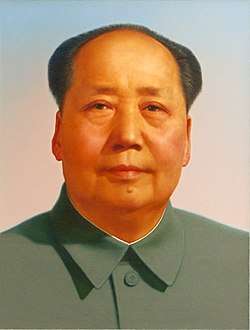 |
Mao Zedong 毛泽东 |
Chairman of the CPC Central Politburo | 20 March 1943 – 28 September 1956 | 1 October 1949 ↓ 9 September 1976 (26 years, 344 days) |
Mao Zedong Thought | Himself | Himself Liu Shaoqi Post abolished |
Zhou Enlai Hua Guofeng |
| Chairman of the CPC Central Secretariat | ||||||||
| Chairman of the CPC Central Committee | 19 June 1945 – 9 September 1976 | |||||||
| Chairman of the PRC Central People's Government | 1 October 1949 – 27 September 1954 | |||||||
| Chairman of the CPPCC National Committee | 9 October 1949 – 25 December 1954 | |||||||
| Chairman of the CPC Central Military Commission | 8 September 1954 – 9 September 1976 | |||||||
| Chairman of the PRC | 27 September 1954 – 27 April 1959 | |||||||
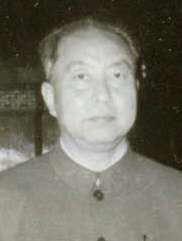 |
Hua Guofeng 华国锋 |
Premier of the PRC State Council | 4 February 1976 – 10 September 1980 | 9 September 1976 ↓ 22 December 1978 (2 years, 104 days) |
Two Whatevers (Mao Zedong Thought) |
Himself | Post abolished | Himself |
| First Vice Chairman of the CPC Central Committee | 7 April 1976 – 7 October 1976 | |||||||
| Chairman of the CPC Central Committee | 7 October 1976 – 28 June 1981 | |||||||
| Chairman of the CPC Central Military Commission | ||||||||
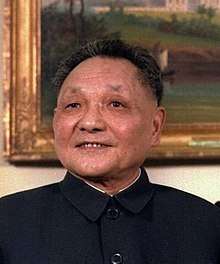 |
Deng Xiaoping 邓小平 |
First Vice Premier of the PRC State Council | 17 January 1975 – 18 June 1983 | 22 December 1978 ↓ 9 November 1989 (10 years, 322 days) |
Deng Xiaoping Theory (Socialism with Chinese characteristics) |
Hua Guofeng Hu Yaobang Zhao Ziyang Jiang Zemin |
Post abolished Li Xiannian Yang Shangkun |
Hua Guofeng Zhao Ziyang Li Peng |
| Chairman of the CPPCC National Committee | 8 March 1978 – 17 June 1983 | |||||||
| Chairman of the CPC Central Military Commission | 28 June 1981 – 9 November 1989 | |||||||
| Chairman of the CPC Central Advisory Commission | 13 September 1982 – 2 November 1987 | |||||||
| Chairman of the PRC Central Military Commission | 6 June 1983 – 19 March 1990 | |||||||
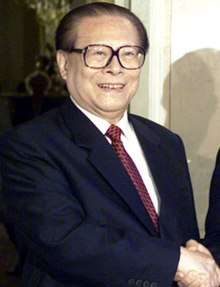 |
Jiang Zemin 江泽民 |
General Secretary of the CPC Central Committee | 24 June 1989 – 15 November 2002 | 9 November 1989 ↓ 14 November 2002 (13 years, 5 days) |
Three Represents | Himself | Yang Shangkun Himself |
Li Peng Zhu Rongji |
| Chairman of the CPC Central Military Commission | 9 November 1989 – 19 September 2004 | |||||||
| Chairman of the PRC Central Military Commission | 19 March 1990 – 13 March 2005 | |||||||
| President of the PRC | 27 March 1993 – 15 March 2003 | |||||||
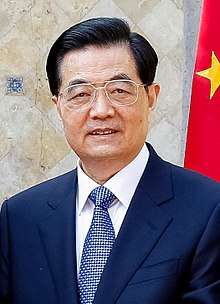 |
Hu Jintao 胡锦涛 |
General Secretary of the CPC Central Committee | 14 November 2002 – 15 November 2012 | 14 November 2002 ↓ 15 November 2012 (10 years, 1 day) |
Scientific Outlook on Development (Socialist Harmonious Society) |
Himself | Wen Jiabao | |
| President of the PRC | 15 March 2003 – 14 March 2013 | |||||||
| Chairman of the CPC Central Military Commission | 19 September 2004 – 15 November 2012 | |||||||
| Chairman of the PRC Central Military Commission | 13 March 2005 – 14 March 2013 | |||||||
_(cropped).jpg) |
Xi Jinping 习近平 |
General Secretary of the CPC Central Committee | 15 November 2012 – incumbent | 15 November 2012 ↓ Incumbent (5 years, 335 days) |
Xi Jinping Thought on Socialism with Chinese Characteristics for a New Era (Chinese Dream) |
Himself | Li Keqiang | |
| Chairman of the CPC Central Military Commission | ||||||||
| President of the PRC | 14 March 2013 – incumbent | |||||||
| Chairman of the PRC Central Military Commission | ||||||||
| Leader of the CPC Central Comprehensively Deepening Reforms Commission | 30 December 2013 – incumbent | |||||||
| Chairman of the CPC National Security Commission | 25 January 2014 – incumbent | |||||||
Notes
- ↑ The office of President is a prestigious one and the head of state. The office was first held by Mao Zedong, but it was abolished during the Cultural Revolution. The Constitution of 1982 restored powers and functions of the President of the People's Republic of China as head of state. This office does not have executive authority comparable to the President of the United States since most of its powers are ceremonial. The President of China can therefore be compared with the President of Germany and contrasted with the President of India, who in theory possesses great executive powers, which are in practice exercised by the Union Council of Ministers.[4]
- ↑ In official pronouncements when describing the existing leadership of the party, state media referred to the party under Hu as the party center with comrade Hu Jintao as General Secretary in contrast to the party under Jiang being described as the party center with comrade Jiang Zemin as its core (核心). Some analysts saw this change as a signal that collective leadership was being embraced over personal leadership.
References
- 1 2 "How China is ruled".
- ↑ Chris Buckley and Adam Wu (10 March 2018). "Ending Term Limits for China's Xi Is a Big Deal. Here's Why. - Is the presidency powerful in China". The New York Times.
In China, the political job that matters most is the general secretary of the Communist Party. The party controls the military and domestic security forces, and sets the policies that the government carries out. China’s presidency lacks the authority of the American and French presidencies
. - ↑ "Xi's here to stay: China leader tipped to outstay term". The Daily Mail. 9 August 2016.
A lot of analysts now see it as a given" that Xi will seek to stay party general secretary, the country's most powerful post, said Christopher K. Johnson, a former CIA analyst and now China specialist at the Washington-based Center for Strategic and International Studies
. - ↑ "Krishna Kanta Handique State Open University". "Executive: The President of the Chinese Republic".
- ↑ "A simple guide to the Chinese government". South China Morning Post.
Xi Jinping is the most powerful figure in the Chinese political system. He is the President of China, but his real influence comes from his position as the General Secretary of the Chinese Communist Party.
. - ↑ "Section 2, Article 80–81".
- ↑ "习近平频现身成常态 将回归"领导核心"?". Duowei News. 7 January 2014.
- ↑ "How the Chinese government works". South China Morning Post.
Xi Jinping is the most powerful figure in China's political system, and his influence mainly comes from his position as the General Secretary of the Chinese Communist Party
.
.svg.png)